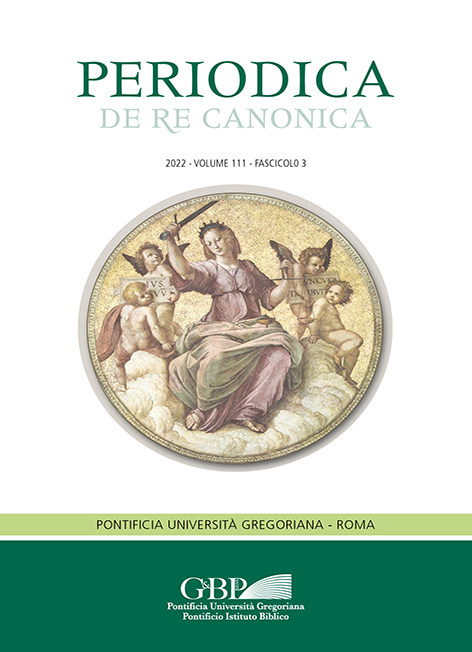Volume 111 - Issue 3
- Home
- Research and Publications
- Periodicals
- Periodica de Re Canonica
- Issues
- 2022
- Volume 111 - Issue 3

PERIODICA RE CANONICA -THIRD ISSUE 2022
Issue 111/3 (2022) of the magazine Periodica de Re Canonica, quarterly published by the Faculty of Canon Law of the Pontifical Gregorian University, is now available.
Gianfranco Ghirlanda, The Apostolic Constitution Praedicate Evangelium on the Roman Curia, 355-420
Abstract: The article is a general presentation of the Apostolic Constitution Praedicate Evangelium. After an introduction on the historical evolution of the Roman Curia, the author considers the basic inspiration of the current reform, which is to be understood as falling within the intent by Pope Francis of reforming of the Church as such. The first and fundamental aspect of this reform is the missionary spirit of the Curia, a reflection of the missionary nature of the whole Church, which is called to commit herself ever more deeply to evangelization in the face, on the one hand, of the secularization of the peoples in whom the Church has been present for centuries and who have lost the sense of God, and, on the other hand, in the face of the ever present need to proclaim Christ to peoples who have never known him. Another prevalent strand of thought is that of communion, synodality and proper decentralization, to which the principle of participation is linked. An element that is highlighted and that reveals the nature of the Roman Curia is that of its ministerial and vicarious character, which entails that those who are in charge in the Dicasteries, to whatever category of the faithful they belong, including that of the laity, always act by the vicarious authority of the Pope and not by their own power. From this there emerges the pastoral and instrumental character of the Curia. The second part of the article is dedicated to the structure of the Curia, the competences of the curial institutions and their composition and functioning. Finally, some curial institutions are taken into consideration, highlighting in their regard specifications and innovations.
Keywords: missionary spirit; evangelization; synodality; decentralization; participation; ministeriality; vicarious power.
Paolo Bianchi, Documental process and interdiocesan tribunal, 421-443
Abstract: On the light of the jurisdiction (explained by the renewed canon 1688) of the diocesan bishop in order to decide a documental process of matrimonial nullity, we face some problems: 1) which is the competent bishop to decide it; 2) which is in the hypothesis that this kind of process is introduced at an interdiocesan tribunal; 3) which is the most correct procedure in order to bring before the competent bishop the case that must be decided. We finally discuss pro and contra of possibility of considerate the documental process as like as an application of the brevior process.
Keywords: documental process; brevior process; the bishop judge; interdiocesan tribunal.
Eric Besson, The Necessary Relationship Between Faith and Sacrament: the Case of Baptism, 445-468
Abstract: The publication in 2020 of the report of the International Theological Commission invites us to resume and deepen the theological-canonical reflection on the link between faith and celebration of the sacraments, in the context of current secularization. The question arises in particular with regard to the faith of the parents who request baptism for their child. After analyzing the main elements of difficulty, the article puts forward some proposals for responding to pastoral challenges.
Keywords: sacrament; baptism; faith education; parents; godfather.
Eva Vybíralová, “Mexican faculties” provided by pope Pius XII and the hidden Church in Czechoslovakia during the communist period (1948-1989), 469-490
Abstract: Last year, the period of the pontificate of Pope Pius XII (1939-1958) was made available in the Vatican archives to researchers. Among other things, it could be verified the text of the socalled Mexican faculties, i.e., the extraordinary measures for the situation of persecution of the Church provided by this Pope to the particular Churches at the time of the establishment of the communist regimes. These special faculties followed on from special faculties from the period of the Second World War, but they were of great importance especially for the underground Church in Czechoslovakia during the communist regime. The latest study of the Vatican archives confirmed also the instructions for the ViceProvincial of the Slovak Jesuits concerning secret episcopal ordinations.
Keywords: persecution of the Church; Czechoslovakia; communist regime; hidden Church; secret ordinations; special faculties.
Romanae Rotae Tribunal, Decretum coram R.P.D. Gregorio Erlebach, diei 3 decembris 2021, in una Nullitatis matrimonii; Praeiud.: Restitutionis in integrum (B. 142/2021), 491-501
Tribunal Metropolitanum Bracarense, Sententia coram Federica Dotti, 4 maii 2020, in una nullitatis matrimonii. Excerptum, 503-526